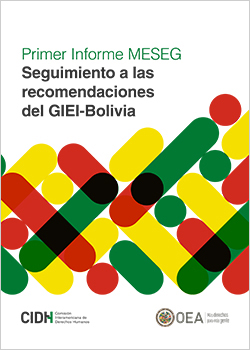
Press Release
IACHR Presents First Report Drafted by Its Mechanism to Monitor Interdisciplinary Group Recommendations for Bolivia
October 4, 2023
Contact info
IACHR Press Office
Distribution List
Washington, D.C. – The Inter-American Commission on Human Rights (IACHR) has published the first report issued by the MESEG-Bolivia, the Commission’s mechanism to monitor the implementation of the recommendations made by the Interdisciplinary Group of Independent Experts for Bolivia (GIEI-Bolivia) in this group’s final report. The work done by the GIEI-Bolivia concerns the acts of violence and human rights violations that happened in the Plurinational State of Bolivia over the period September 1–December 31, 2019.
The report issued to mark the first anniversary of the creation of the MESEG-Bolivia seeks to show the degree of compliance with the recommendations made by the GIEI-Bolivia in 2021, as well as to encourage further talks and to provide guidance to the State to ensure the effective implementation of those recommendations. In its report, the MESEG assesses compliance with the recommendations and identifies the main challenges for implementation, based on the General Guidelines on the Follow-Up of Recommendations and Decisions of the Inter-American Commission on Human Rights.
This first annual report to monitor the work done by the MESEG-Bolivia has three chapters. Chapter 1 addresses the background, objectives, and methodology. Chapter 2 addresses recommendations concerning redress (recommendations 1, 2, and 3) and investigation (recommendations 5, 6, 7, 8, 9, 10, and 13), and it also includes some structural recommendations on which the State has reported substantial progress (recommendations 11, 16, 28, 35, and 36). Chapter 3 presents conclusions, a roadmap, and further observations made by the Inter-American Commission.
Among the findings in this initial report, the IACHR notes that the State has taken substantial compliance measures—among others, to strengthen the institution and independence of the National Preventive Mechanism Against Torture—and some action in response to needs that arose in the wake of the violence. Several amnesties have also been revoked, in cases involving serious human rights violations that were identified in the report issued by the GIEI-Bolivia.
Some of the progress that was identified in the report includes organizing redress measures for victims of various acts of violence (for instance, public events to support certain groups) or adopting standards like the Plurinational Comprehensive Reparation Policy and various measures to create memorials to the victims.
Among the challenges that have been identified, one stands out—the fact that, almost four years after these serious human rights violations were committed, a comprehensive reparation program is yet to be implemented and institutionalized for all victims (including the families of the people who were killed and the individuals who were arbitrarily arrested, tortured, persecuted, or otherwise affected by the violence), which evidences a lack of State protection and safeguards.
A further challenge includes the difficulties to grant the victims adequate access to justice. The MESEG-Bolivia is concerned about the fact that many of the ongoing investigations have made very little progress. The IACHR reminds the State that coordinating efforts with public prosecutors and ensuring their commitment are both essential to ensure access to justice.
Based on the findings held in this report, the Commission notes with concern a social context where intimidation of victims is encouraged in some criminal law proceedings and where stigmatization persists along with the failure to take action to restore victims’ honor and dignity. The Commission is also concerned about persistent violence against women and indigenous peoples. As the GIEI-Bolivia has noted, in order to prevent violent clashes, action must be taken to enable the coexistence of different people who choose to live and connect in an intercultural democracy.
Finally, the Commission hopes that this report will serve as a tool to encourage dialogue and to ensure the involvement of both the State and civil society to attain effective compliance with the recommendations made by the GIEI-Bolivia. The IACHR stresses its willingness to cooperate with the State to ensure that these recommendations are implemented.
A principal, autonomous body of the Organization of American States (OAS), the IACHR derives its mandate from the OAS Charter and the American Convention on Human Rights. The Inter-American Commission has a mandate to promote respect for and to defend human rights in the region and acts as a consultative body to the OAS in this area. The Commission is composed of seven independent members who are elected in an individual capacity by the OAS General Assembly and who do not represent their countries of origin or residence.
No. 238/23
9:00 AM


